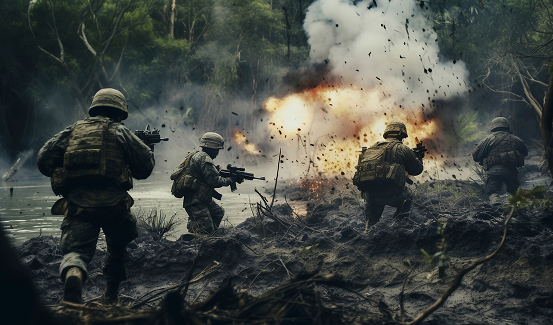Leadership in the military is often praised. It looks powerful. It looks sharp in uniform. People assume leaders have all the answers. They follow orders, give commands, and lead troops into battle. That may be true on the outside. What people do not always see is the emotional weight behind that role. I have worn that responsibility. I have written about it in Blood, Tears, and Purple Hearts. My character, Lieutenant-Commander Ali Cabrillo, is a strong leader. She is smart, respected, and focused. Yet even she cannot escape the emotional toll that comes with command. Leading others in high-risk environments is not just a job. It is a deep emotional experience. One that can leave scars that do not always fade.
Making Hard Decisions
As a leader in the military, your decisions can affect lives. You may choose which team goes into danger. You may approve a mission that feels too risky. You must act quickly, with limited information, and full responsibility. These choices stay with you. Even if things go right, you remember what could have gone wrong. If something does go wrong, it hits even harder. The burden does not fade when the mission ends. In Ali’s case, she leads a team on a mission that goes sideways. A close friend dies. Others are injured. She walks away with wounds—some physical, some emotional. She questions every move she made. She asks herself if she failed. This is the silent battle many leaders face.
You Are Supposed to Stay Strong
Leaders are trained to stay calm under pressure. You are told to hold your emotions together. You must keep your head up for your team. That’s the expectation. So you do it. You push your pain down. You focus on the task. What no one talks about is what happens afterward. After the mission. After the shouting stops. After the uniforms come off. That’s when the emotions rise. The doubt. The guilt. The grief. The exhaustion. I have spoken with military leaders who said they never felt allowed to break down. They were supposed to be the strong ones. The examples. The rocks. So they kept going—until they couldn’t.
Carrying the Pain of Others
Being in command does not mean you are untouched by loss. In fact, you often carry more of it. When a soldier under your command is injured or killed, it changes you. You think about their family. You wonder if you could have done something different. You replay every step in your mind, looking for where it all turned. Ali, in my book, wrestles with that exact feeling. Her grief is not just for herself—it is for the people she led. She blames herself even when others tell her not to. That is something many leaders do. They carry the weight, even when it is not all theirs to bear.
Leadership and Loneliness
One of the most challenging aspects of military leadership is isolation. You cannot share every thought with your team. You cannot show all your fears. You must make decisions that may not be popular. That creates distance. You may be respected. You may obey. Still, it can feel lonely. I have seen commanders who smiled during the day but cried in private. They had no one to talk to. No one to vent to. The pressure builds, day by day. Leadership can be a quiet place, especially when lives are at stake.
Leadership During Recovery
Even after combat ends, the leadership role doesn’t stop. You are still expected to provide answers. You are still seen as strong. Inside, though, you may be falling apart. In Blood, Tears, and Purple Hearts, Ali returns home physically wounded. Emotionally, she is a wreck. Yet people expect her to bounce back. They see the rank, not the pain. They forget leaders need care too. This is true in real life. Many military leaders are not given the emotional space to heal. They are offered medals, not therapy. Recognition, not rest. That needs to change.
Leadership Requires More Than Strength
Real leadership is not just about giving orders. It is about caring. It is about protecting others. That kind of leadership comes with emotional risk. You put others first. You carry their pain within you. That is why so many leaders suffer silently. We need to create safe spaces for them. Spaces to talk. To rest. To feel. No one should have to carry that kind of weight alone.
Stories Help Us Understand
I wrote Blood, Tears, and Purple Hearts to explore this side of leadership. I wanted readers to see the person behind the rank. The heart behind the command. The struggle behind the strength. Ali is not just a character. She represents real people I have met. Real leaders – real service members. People who gave everything, even when it broke them inside. This story is for them.
Remember the Human Side
The next time you see someone in uniform with stripes on their shoulders, remember the weight they may carry. They might look strong, but they could be grieving. They could be doubting. They could be healing from something you will never see. Leadership in the military is not just a position. It is a role that requires great sacrifice. It takes heart, courage, and emotional endurance. It can also leave behind deep scars. This is what I explore in my novel.
Pre-order the book now on Amazon and read the full story of Ali Cabrillo’s emotional journey as a military leader.
To learn more, visit the official author website for more articles, updates, and behind-the-scenes insights.
